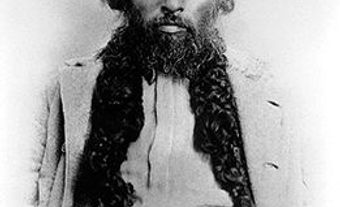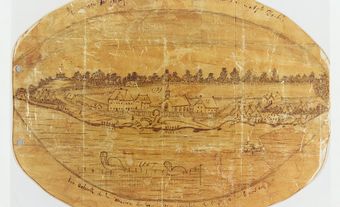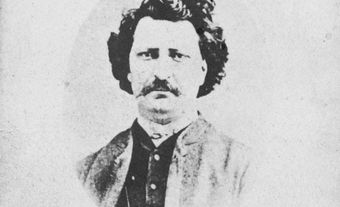Cuthbert Grant, fur trader, Métis leader (born circa 1793 in Fort de la Rivière Tremblante, SK; died 15 July 1854 in White Horse Plains, MB). Grant led the Métis to victory at Seven Oaks in 1816 and founded the Métis community Grantown (later St. François Xavier), Manitoba, in 1824. Today, Cuthbert Grant is hailed as a founder of the Métis nation. (See also Indigenous Peoples in Canada.)

Early Life
Cuthbert Grant was born to Marguerite, an Indigenous woman, and to a father of Scottish descent, also called Cuthbert Grant. Grant Sr. was a prominent fur trader in the North West Company (NWC).
Grant spent his early childhood in different NWC fur-trading posts along the Assiniboine River. Before his father died in 1799, he left money in his will to cover the education of his sons, Cuthbert and James. Grant Sr. named William McGillivray, the NWC’s Montreal agent, their guardian.
When he was about eight years old, McGillivray took Grant to Montreal in 1801. There, he was baptized on 12 October in the Scotch Presbyterian Church (later St. Gabriel Street Church), which his father had helped build through donations. While his brother went to school in Scotland, Cuthbert was educated in Montreal under McGillivray’s supervision.
Did You Know?
Cuthbert Grant was also known by the name Wappeston (white ermine).
North West Company Career
Cuthbert Grant began working for the NWC’s Montreal offices around 1810. By 1812, he became clerk to the Upper Red River department and was posted to Fort Espérance in Saskatchewan. During this time, the NWC and Hudson’s Bay Company (HBC) were fighting for supremacy over the fur trade in Canada. Tensions heightened when Lord Selkirk, an HBC director, created a new settlement in the Red River valley along the routes where the NWC transported furs and pemmican.
In 1814, Miles Macdonnell, the colony’s governor, upset Métis and NWC traders when he no longer allowed them to export bison near the settlement or access Red River pemmican. (See also Pemmican Proclamation.) As a means of gaining the Métis as allies in their fight against the HBC, the NWC appointed Grant the captain general of the Métis.
On 7 June 1815, Grant and the Métis attacked the Selkirk settlers and stole their livestock. Similar activities among other Métis groups forced the abandonment of the colony in June. Tensions between the HBC and NWC remained high. Fur trade disputes escalated, becoming known as the “pemmican wars.” This ended with the Battle of Seven Oaks or la Victoire de la Grenouillère on 19 June 1816.
Battle of Seven Oaks
In 1816, Cuthbert Grant led about 60 Métis and First Nations men west across Frog Plain north of the Red River settlement to deliver pemmican to the NWC canoe brigades on Lake Winnipeg. When HBC Governor Robert Semple and his men confronted Grant’s group, gunfire and hand-to-hand combat broke out. Semple and 20 of his men died. On the Métis side, one man died and another man was wounded.
The HBC implicated Grant in the murder of one of their officers in August1816. Grant surrendered himself in 1817 and faced charges in Montreal. Grant was cleared of all indictments and he returned to the West.
Life and Career after 1821
In 1821, the competition between the NWC and HBC came to a close, as they merged and became one company under the HBC name. Still wary of Métis traders, the HBC planned to befriend Cuthbert Grant as a way to help stabilize and control Métis in the Red River. In July1823, the HBC appointed Grant as clerk at Fort Garry and made him a special constable.
Grant resigned the following year and accepted a land grant on White Horse Plain, where he started farming. There, he founded a small settlement, known as Grantown (now St. Francois Xavier), about 29 kilometres west of Winnipeg. Eighty to 100 Métis families joined him.
In 1828, the HBC appointed Grant “warden of the plains” to prevent the illegal trading of furs. Seven years later, in 1835, he was appointed as justice of the peace for Assiniboia’s fourth district. In 1839, he joined the Council of Assiniboia and became one of Assiniboia’s two sheriffs.
Decline in Influence
During the fur free trade struggles of the 1840s, Cuthbert Grant remained loyal to the HBC, which made him unpopular with the Métis. A younger generation of Métis nationalists defied his efforts to uphold the HBC monopoly at the Sayer trial in 1849. This brought his career as the warden of Assiniboia to an end.
By the 1850s, the radical politician Jean Louis Riel, father of the renowned Louis Riel, supplanted Grant’s power and prestige among the Métis. Riel Sr. was part of a new generation of young, rebellious French-speaking men who took leadership away from Scottish Métis such as Grant.
Significance and Legacy
Cuthbert Grant helped to ignite in the minds of the Métis the concept of a Métis nation. This newfound sense of identity played an important part in the Red River Resistance (1869–70) and the North-West Resistance (1885).
Grant is widely commemorated and celebrated in the Métis community and beyond. In 1972, the Government of Canada recognized him as a National Historic Person. The Manitoba Métis Federation named 2016, which marked the 200th anniversary of the Seven Oaks conflict, as “the year of Cuthbert Grant Jr.” The St. James Assiniboia Pioneer Association hosts Cuthbert Grant Day every July.

 Share on Facebook
Share on Facebook Share on X
Share on X Share by Email
Share by Email Share on Google Classroom
Share on Google Classroom





